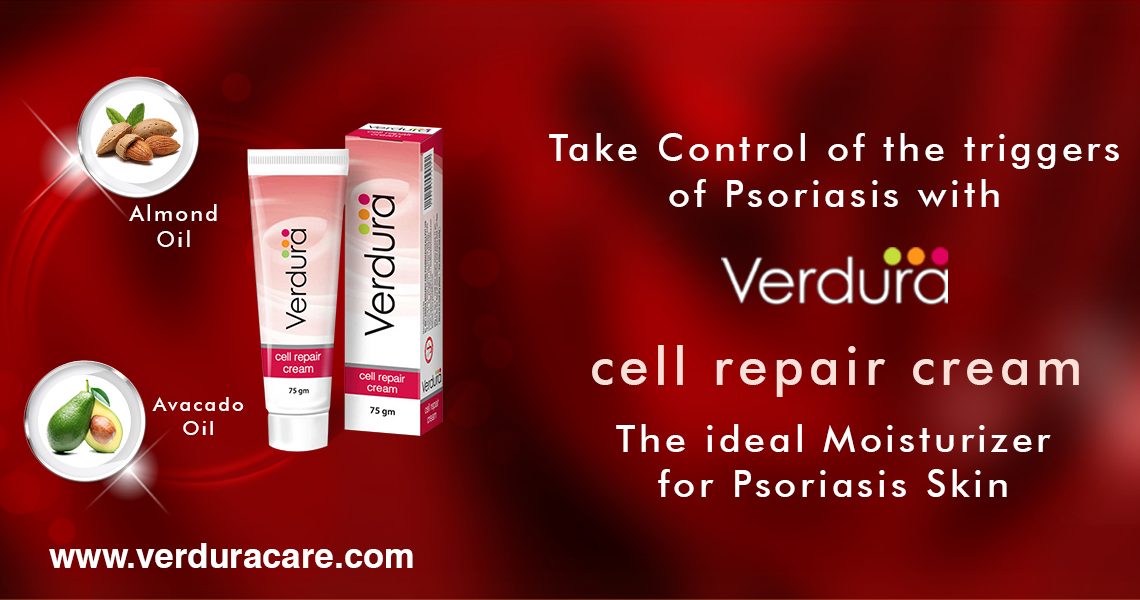Repair your dry scaly Psoriatic skin

Psoriasis is a skin disorder that causes skin cells to multiply up to 10 times faster than normal. This makes the skin build up into bumpy red patches covered with white scales. They can grow anywhere, but most appear on the scalp, elbows, knees, and lower back. Psoriasis can’t be passed from person to person. It does sometimes happen in members of the same family.


Causes
Your Genes and Your Immune System
Little bits of your DNA called genes are instructions for your cells. Some genes are only active at certain times. When you have psoriasis, the genes that control your immune system signals get mixed up. Instead of protecting your body from invaders as it’s designed to do, it promotes inflammation and turns skin cells on overdrive.

What are the available treatments?
- Topical corticosteroids
- Vitamin D analogues
- Anthralin
- Topical retinoids
- Calcineurin inhibitors
- Salicylic acid
- Coal tar
- Moisturizers
Initially, treatment often involves topical creams applied to the skin to help relieve the symptoms of the condition. Treatments vary on the type and severity of psoriasis.
Creams and ointments that you apply to your skin can effectively treat mild to moderate psoriasis. When the disease is more severe, creams are likely to be combined with oral medications or light therapy.
Do moisturize. Dry skin is the severe problem in the outbreaks of psoriasis, so keep your skin well lubricated. After bathing or showering, seal in moisture by applying a generous amount of moisturizing cream or ointment to your skin. Avoid lightweight lotions, which don’t contain enough emollients.


Moisturizing creams/ointments alone won’t heal psoriasis, but they can reduce itching, scaling and dryness. Moisturizers in an ointment base are usually more effective than are lighter creams and lotions. Apply immediately after a bath or shower to lock in moisture. This helps to reduce skin dryness and irritation. Be especially diligent about moisturizing during the winter months, when cold outdoor weather and overheated buildings are a particularly drying combination that worsens psoriasis.
When the skin is hydrated, the scales soften and fall away, alleviating itch and dryness. Emollients create a barrier on the skin’s surface. The barrier protects the surface with oils and allows the skin to rehydrate. This helps to reduce skin dryness and irritation.


Keep Your Skin Moist and Smooth – Ultimately what your skin wants
It’s one of the most effective yet easiest things you can do for irritated skin. It can help your skin heal and reduce dryness, itching, redness, soreness, and scaling. Use more on cold or dry days.
Choose your moisturizer based on how dry your skin is. Ointments are thick, heavy, and good at locking in moisture. Lotions are thinner and get absorbed more easily. Or, you can pick a cream/ointment that falls somewhere in between. Look for a fragrance free moisturizer.
Creams that trap moisture in your skin work best in Psoriasis. One such promising cream is Verdura cell repair cream – Proven to inhibit the triggers of psoriasis


Best cream for psoriasis enriched with the goodness of almond and avocado oil. Psoriasis cream that provides intense moisturisation and repairs cell damage in extreme dry and scaling conditions.
Key benefits
- Decreases inflammation and skin scaling
- Reduces trans epidermal water loss
- Balances hydro-lipophilicity on psoriatic skin
- Repairs cell damage and scavenges free radicals
- Revitalizes and smoothens dry scaly skin
Usage Instructions
Apply over required areas thrice a day.